
We need to expand our team of proofreaders as we aim to increase the rate of republication of Satsvarūpa Mahārāja’s books as well as new books that he writes.
This includes a need for fluent bilingual Spanish and English speakers to proofread Spanish translations (we currently have around 20 Spanish translations waiting to be proofread).
Anyone interested in this particular service should contact Manohara dāsa at [email protected]
If you would like to help, please contact Kṛṣṇa-bhajana dāsa at [email protected] or [email protected] and we will find you a service that utilizes your talents.
Here in the farmlands of Marche, Italy, they predict a week of rain. We have never come to Italy when the weather is beautiful. I am keeping the windows closed; it’s too cold and gray out there and it is already misting. I can take a gray-day atmosphere just as well as a sunshiny one. I want to chant until nothing else matters.
Two pencils on the desk . . . When you pause for a moment to take stock of your surroundings and tell that truth to others—it is a truth—then you can go forward on a foundation of truthfulness. Everything (jagat) isn’t maya—it is raining out and birds are singing. I took my walk in Wellington boots. The phone is ringing. This is a break in between japa sessions.
******
I have been thinking of a poem I wrote in my First Street apartment in 1967. It’s called “Separation.” The gist is that I am chanting japa on my red beads, sitting on the floor beside the radiator. The hours are passing in japa and it occurs to me that I can aspire to become perfect in Krsna consciousness just by chanting. I had recently heard from Swamiji and from his books about the Vaisnava teaching known as “separation from Krsna.” So it came out like this, partly honest and I suppose partly pretentious, trying to be a Vaisnava poet:
What difference will it make
if I go down to the river to look for You in the stream of the water—
or if I sit down here before Your picture?
Either way it is the same because
I have Your Name to recite over and over
and it seems I have actually done both,
by thinking of the river I have gone there
and I’ve come back to where I have not left—
sitting before Your picture.
Everything seems empty and vacant because I am not worthy
and do not really have You as my Lover and Friend.
Or I do not understand
that You Love me beyond what I can measure —
I cannot realize that.
I think only that You should love me more than anyone
and then I think I am unspeakably low.
Nothing saves me but Your Name—
To say “KRSNA,” and say all
the words of the mantra
together, HARE KRSNA
HARE KRSNA KRSNA KRSNA
HARE HARE / HARE RAMA HARE RAMA
RAMA RAMA HARE HARE
—and actually saying it hundreds and thousands of times,
alone with You—then I’m pacified.
Though the truth is I am lazy and
as empty-handed as any impersonalist philosopher,
still recitation of Your Name is a balm
to this separated soul who is trying
to come back just on Your Name.
******
Quantity, quantity—until you get past your own face and past worrying whether the posture is comfortable, and until the long, long rounds stop coming and they become no more than eight minutes thirty seconds, and until you keep going, more, more . . .
******
The writing is an extension of the japa—rolling, unconscious, with faith in the process. There are some pastimes we don’t discuss with unqualified persons. He has so many pastimes all occurring at once—even Sesa-Ananta cannot describe them all with His thousand heads. Some pure devotees go on chanting His glories without end. Don’t you see how pitifully small you are and how tiny is your devotion?
******
Prabhupada on the back cover of Namamrta: he is holding one of his student’s beads. He is showing how to chant. He looks knowing, pleased, very fatherly, or even grandfatherly. Don’t touch the beads with your index finger. Two garlands hang around his neck. His cadar is wrapped around his lap. It is chilly where he is in South America. More beads hang around the microphone stand. He is formally initiating new devotees into the chanting of the holy names.
******
More japa. How many heartbeats? How many lifetimes? How many rounds until you become a pure devotee? What will it be like? What will your service be? When can I chant in loving service?
pp. 10-14
Los Angeles
31st January, 1969
My Dear Satsvarupa,
Please accept my blessings. I have received your letter dated January 28, 1969 regarding Jadurany’s sick health. She requires complete rest. All of her work should be suspended, and she should be given liquid foods, just like barley water mixed with milk. Purchase pearl barley from the market, and the recipe is 1 cup of barley and four cups of water to be boiled for at least 1/2 hour. That liquid preparation may be mixed with milk and sugar, and she may take. Jadurany must not exert herself in any way. She should take complete rest and chant Hare Krsna. When she next wants to begin work, she must take my permission. For the time being, all work must be suspended.
I think that work on the pictures shall remain suspended for the time being. Altogether I have received four pictures for the Krsna book, and two pictures for the temple, one of My Guru Maharaj and one of Gour Kishore das Babaji.
Regarding the two missing verses of the third canto, I shall get them done conveniently. I hope that by this time Jadurany’s health must have improved. Please convey my blessings to the others.
Your ever well-wisher,
A.C. Bhaktivedanta Swami
******
By the time I received this letter, Prabhupada had already started working on KRSNA book. His original premise was that he would start writing as soon as he had a “quick artist.” Prabhupada wrote to Jadurani on December 5, 1968:
As soon as possible, I will require some artist who will paint pictures from the Bhagavatam as I give hints on what to paint. But the artist must be very quick. Two or three pictures must be done every week. These pictures will be used for my new book Krsna, which I will begin as soon as I get the assistance of a quick painter. I am sure that you could do this but you are already engaged with so much work.
Jadurani, of course, wanted to do these new paintings herself, and although Prabhupada agreed to her proposal, he also sent Joy Fulcher from Seattle to help her.
Prabhupada conceptualized the KRSNA book as a large illustrated book with at least one painting per chapter. Jadurani was ready to start painting for it immediately. Prabhupada then sent a second letter outlining five scenes from the first chapter and recommended an illustrated Bhagavad-gita to the artists as reference. (Many of the images the ISKCON artists painted were later copied from that book—Krsna driving Arjuna’s chariot and other scenes from the beginning of the Tenth Canto.)
We had little money, so Jadurani painted on plywood and small pieces of sheet rock. As soon as she and Jahnava sent their first paintings to Prabhupada for approval, the project took off.
I was the typist for KRSNA book. It was so wonderful for ISKCON that Prabhupada began to write it. We didn’t understand why he had decided to write KRSNA book, but later he told us that he was afraid he might not live to finish translating the Tenth Canto, so he wanted to give us at least a summary of it. His mood was similar to Krsnadasa Kaviraja’s mood, who summarized the Antya-lila at the beginning of the Madhya-lila because he was afraid he would die before he finished writing the book. Krsnadasa Kaviraja Gosvami did live to complete the Caitanya-caritamrta, but Prabhupada didn’t finish the Tenth Canto. Now we reap the benefit of his wisdom in writing KRSNA book. If Prabhupada hadn’t given us Krsna’s pastimes, we wouldn’t have been able to hear them from anyone else. Indian visitors to the temple often tried to tell us stories about Krsna, but we almost always rejected whatever they said as un-bona fide. We tended to reject everything that we didn’t directly hear from Prabhupada.
By the time I received this letter, Jadurani had become ill. I don’t remember all the symptoms of her illness, but I do remember that she was extremely weak. Still, she refused to slow down. She drove herself past the limits of a normal person, almost as if she didn’t believe she had a material body. We were so neophyte in those days, and devotees would often fanatically apply philosophical points such as “I’m not this body.” We considered it laziness or maya to indulge the body in sickness. It’s as if we thought that giving any attention at all to the body would reveal our lack of faith and advancement in Krsna consciousness, and we often tried to work twenty-four hours a day. If anyone tried to correct that mentality, they were seen as “maya personified.”
Prabhupada expected us to balance service and sadhana and to maintain good health. He considered a devotee’s health of primary importance; the demand on him or her for service was secondary. It’s not that the spiritual master insists that the work be done without concern for the devotee’s well-being. Prabhupada did not immediately replace Jadurani with another artist. He gave her time to recover and to take up her service again. Prabhupada wasn’t whimsical or sentimental, but it was very much a part of his teaching to his disciples that they lead regulated lives and eat proper diets. He taught us not to neglect our health early in our Krsna consciousness because it was so much his own mood. Not only did we learn to maintain our own health, but we learned not to neglect other devotees who may be suffering from illness.
pp. 82-86
Oh, what’s this?
It’s my remembrance of a
day…
go forth and be with God
in the simple life He gave –
Linked by the sound –
hold hands in maha-
mantra.
You can play, improvise, don’t be
afraid, God is talking through
you and you give back to Him affection
I’ve heard
pure devotees don’t even
aspire to the goal
back to Godhead
what about you –
all the friends I know and how
they struggle
“rife with humanism”
wife with ooma-ism
evil effigy of terracotta
face
no, I can’t tell you what
I’m thinking because poems
do that sometimes
but here’s straight stuff:
Krsna goes into parikramas.
Vermillion by women,
the saintly person told
the disciple that Krsna can
simultaneously be playing in the fields
and hear all sadhakas’ prayers
and He told them, in the future
an acarya would come in
metal vimanas
writing books as he travelled
in the language of the mlecchas
I heard strong wind and maybe
rain like a cat hunting, hiding
of the wild and greeted no
matter what
And walk with maha-mantra
no matter what – oh Lord,
give me some warning, I do
want to touch your Vrndavana
again.
Please take me from my
stupor and envy, I wish
to honor the great and small
devotees and see God-Krsna
even in the little stones
and preach.
***
O Krsna, please let
us be sports with You
little Krsna
we see You expand some-
times, it’s amazing
then You cry for your
parents’ attention
we see You kill a giant
demon and then desire to
be cuddled. We see
You tease the gopis
and then hear about
the Baka…
Oh, the wind is
tugging at this shed
and the lights blinked out
I knew it could take me
on a tumble ride.
Please Krsna, if it pleases You,
let’s go riding down
a slope, a fair weather
as in Your Govardhana Hill
pastimes
when You said, “I know
it looks very bad and you are
all crying, but if you come
under this hill I’m
holding like an umbrella
it will be all right.”
Krsna calls and cats come too
change the words for better
ones and put me to bed
they think sleep is a game
I’ll be exercising in the yard
instead. Krsna pushing
me through a day.
***
Monks, travelers of long-gone China
India, sadhus of today
the competing parikramas
I’m out from all that in my
little shed on a rainy day.
I’ve collected pretty
leaves in reds and greens,
both at the gate shut,
rain runs down the lane,
no one will come, I think
you can take a quick
nap and dream
a painting with a free hand
my words kept saying what I
didn’t mean – paint, dream,
of never wine
chant Hare Krsna and be free.
***
Alone is all right.
I have no wife-poems
to tell. No failure of
service. I worked
that out earlier today
at least for a while I
accept for myself and tell myself
he accepts me.
I’m a writer, people say
that my book of Christian
saints with Vaishnava saints
helped the high school boy,
Obstacles help the devotees
in China…
So, I’m compassionate too,
“Just like” the devotees going on mass harinama
tonight.
It’s all right, alright, this kind of
writing and assuring some
others you can do it –
fish within yourself,
give lectures on his books.
Rise early and chant the minimum.
***
He passed away
while still young –
“I remember Clifford” –
“I remember Rupa”
I remember the saintly persons
who passed away old
or young, who lived on the
banks of Radha-kunda
or the Brooklyn
or Boston temple
who passed away in a
moving van, oh cruel,
no…Don’t think like
that, Time has its
job to do
the soul doesn’t die
no matter.
And the
artistry doesn’t fade
or get destroyed if it
was well done.
We may go visit the
places of the departed ones
to perform a bhajana or
life’s work there,
in their shadow.
Not maudlin about it.
Opening their follower,
crying our tears of
separation, we wish could
flow.
And not deviating from their vani.
“I remember him” in that
way is best.
Sadness will be defeated
eternal joy with Krsna
and rejoined all sadhakas
who get taken apart
only a while.
***
He was blue
cried about that but
I told him, just
make an offering of any little
thing you have to Krsna.
“Who’s he?” he asked.
I commenced to tell him
what I’d learned in Bhagavad-
gita. It was fun, I go into
it, as skillfully as I could.
It didn’t totally convince him
of course, but we sure tried,
the group. He said, that sounds,
“pretty good” and looked at
the sincerity as it might
appear in our voices.
You can be blue for Krsna
was really what we
were saying.
Told of the gopis’ separation,
told of Lord Caitanya, all
those years in the
Gambhira – we always
just say whatever
sounds appropriate –
way over our heads.
Konark,
the fisherman’s net,
the tears of Raghunath Goswami
years later.
And what, me?
just be cheerful
if you feel some upbeat
take that as His mercy
and go with it.
***
O Krsna, I want change and no change.
Oh, all friends blown
away like leaves. No
reason to like them any
more. I can’t live near
them.
I can’t bear to keep up with
what they’re doing and after
meeting they say, “Don’t
write about me in your
diary.” So, what is to be
done?
Write about the rocks
trees and toadstools
they don’t complain, write
about the blanket on
your lap, make it immortal…
make your mouth shut.
Make your mark on the
rock – this monk forgot
to go out and then went
out…
Alternative:
give him my salute of
November 1st, it’s Veteran’s
Day, something about the
union
thank God and serve
in His corps.
***
Little under the roof
little doubts swing
back and forth, little
fires and confirmations,
bring us to the dark end
of another peaceful day.
Soon we can read
the sastra and light the candle
for Damodara.
Can’t expect to sleep so well
after so much sleepiness, but
maybe I’ll go down and meet
those dreams of Prabhupada
distant but present and we are
serving him
overnight cruising in strange
mixtures, surprises – like
125 Katan Avenue turning into an
ISKCON temple and they ask me
to take GBCship
no, no, I say. But I want
to serve him in some way.
May these poems be accepted and
hearing and lectures and little tours
who are you out there?
Do you read this?
pp. 18-21
You need your heart fixed. Got to clear the fog, the fear that old age is going to shut you down. Srila Prabhupada went into New York City with no money when he was advanced in age. He left the familiar surroundings of Vrndavana to preach in the mleccha-ruled West.
You ought to think how you can spend your old age in a way that befits his disciple. Try to rise to the occasion. Don’t just dwindle and die.
You need courage, endurance, sobriety, enlightenment. Don’t look for the easy way out. Take the difficult path to attain the goal.
Oh, preach to me, sailor,
of waves at sea and
prattle in the storm.
I mean preach
to me of a better way
if you know one, and if you
can handle an old dog like me.
Preach to me, mate, but remember:
I’m old—I know all
the tricks. And I know
we dream of many things
that when we wake have
little use. Srila Prabhupada said,
“If you want to please me,
distribute my books.”
And he said he’d be most pleased
if we became lovers of Krsna.
Can you preach this to me? Apply it?
I know I’m tough.
So, a book is to be written this week. It could be set in the PIO office. In a dream I was being taken on board, a new man, to see the ship and its crew. I woke up before I got there.
Then if this is not to be your setting, what is?
Do you plan to hold harangues and discourses for the entire week, even though he already knows the philosophy and what an ideal person would do?
A banner outside the building: a picture of Lord Caitanya with His arms upraised. It hangs from a pole on an upper story of a façade. There’s an awning to the street like the one we had on the old ISKCON skyscraper on 55th Street. It was too expensive to keep up. Now they struggle in Brooklyn.
Where are the men or women with vision?
Will someone distribute my books? Is it all right to wish they would? To see my writing as my career in Krsna consciousness? Or are my books usurping the place Srila Prabhupada ’s books are meant to exclusively fill?
You see, I thought my career should be low-profile but as intense as blue flame. I didn’t think that building a bonfire—a show of service—was either the goal or the best way to serve my spiritual master. I certainly don’t seem to need an official position or a territory of my own to settle my identity as his servant. So keep this in mind when you preach to me. Don’t assume I’m in maya just because I write my own books and look for lonely places to take walks.
I definitely think my “career” is based on preaching to the devotees. One group of ISKCON preachers throws out the net and pulls in the catch, while another group takes care of the newcomers and helps them find inner conviction. Then someone has to preach to the middle-timers and the old-timers, whose needs are not the same as the newcomers. I’ve got a duty as a writer to preach.
Therefore, keep this in mind when you preach to me. Don’t assume too much. If you can put me in touch with the Supersoul and with Prabhupada ’s specific desire for me, then I will be indebted to you. But don’t appoint yourself authority over my soul otherwise.
Angels of mercy, dispel the doubts.
Let me ride with the preachers or
Wo rship their feet.
I ask for enlightenment, attention
to the messages of Godhead. I have
heard such enlightenment comes from vaisnava-
seva and from hearing. I have heard
but my heart remains . . .
not so good.
Angels of mercy, Vaisnava thinkers,
please see my plight.
I am fortunate, I know, but
I’m not so good—a victim
of Kali, a timid soldier,
a poet.
Judge for yourself.
Come preach to me.
Basic tenets:
Sri Krsna is everyone’s teacher.
Horses, horses—the best ones pull the chariots of Lord Krsna and Maharaja Pariksit. White horses for the Lord, and black for the son of Abhimanyu. The horses in the allegory of the uncontrolled senses. Control your senses and drive those horses with the reins of intelligence. These are the horses of saranagati.
Horses of doubt should be refined.
More tenets later.
Now, is there a story to tell?
Once upon a time a cliff fell down to the beach. Pieces of sand bank collapsed into the Yamuna. Time and the forcers of Kali work to destroy even ancient towns,
once pure
and peaceful.
But something good remains.
The ISKCON devotees are colonizing Vrndavana with a spirit of appreciation.
They know Narottama dasa Thakura sings that you have to enter Vrndavana without an enjoying spirit. For me, I think it’s still best that I sometimes visit, but live “everywhere” as a preacher.
O sailor, go back not to the Navy
of this world
but to the sea of your aspiration.
Seek and find the guru’s mission
and serve his followers.
Challenge and inspire us even as
you approach old age to also enlist
in the seafaring.
pp. 98-102
Nimai wanted to hold an ista-gosthi with himself and the mice. Many things had happened recently, but they had not been able to have heart-to-heart talks about them. An opportunity came when almost all of the Trinidad devotees went into town to distribute books at a Hindu festival. Nimai volunteered to stay back to maintain the temple.
“We will make an agenda for an ista-gosthi,” said Nimai. “Do you have any topics?” They sat in a second-story back porch of the temple building. It was evening, and the sound of frogs filled the air.
Chota said, “I would like to hear you discuss, Nimai, how a devotee can develop humility.” Nimai wrote the topic down and asked for others. Arjuna asked if Nimai would tell them about upcoming travel plans. Yamala said he would like to give a report on their preaching.
“I have a couple of topics also,” said Nimai. “I would like to speak a little bit about grhastha life, at least my own plans for it. And also I would like to have a discussion and hear from you about the topic of our relationship.”
It was actually this last subject which had prompted Nimai to hold the open meeting. He felt that his relationship with the mice was going through a significant change, and he wanted to face the truth of it.
“What do you want to say about humility?” asked Nimai.
Chota cleared his throat. “I just wanted to say,” he said, “that I have been guilty of great pride. When we met that old mouse who watches the aratis in Santo Domingo, I saw that he was actually a devotee. I was shocked because I thought that I was the only devotee among all mice in the world.”
Nimai and the mice laughed at Chota’s realization.
“Even Lord Brahma,” said Nimai, “once thought that he was the only Brahma, or controller of a universe. But Krsna showed him that there are trillions of Brahmas, and in fact the four-headed Brahma is the smallest of all.”
“I realize a little better now,” said Chota, “that Krsna can reveal Himself, and does, to many different mice and to any creature He wishes, anywhere in the world.”
“But that should not diminish your desire to spread Krsna consciousness,” said Nimai.
“Oh no!” said Chota intently. “I can see that there are very few devotees. For example—Yamala Prabhu, why don’t you tell Nimai about our sankirtana in this temple?”
Yamala then told of the mice within the temple. “Just because they live here,” said Yamala, “they think they are superior to everyone and that they know everything about temple life. Actually they didn’t know anything about higher consciousness. But when we tried to tell them, they said whatever we knew was unimportant.”
Nimai was no longer amazed to learn that whatever strange phenomenon existed in human society, a similar version was carried on in the lower kingdoms. But the mice wished to tell Nimai all the details, and he was eager to hear from them.
When it was Nimai’s turn to talk about grhastha life, he no longer felt inclined to say much. He mainly wanted to explain what had happened in the hotel room the other night, and how it was very dangerous. Kesava Prabhu had said that marriage would protect one from temptations. The mice were respectful of Nimai’s personal plans for grhastha life, but it was not a subject that interested them very much. So he dropped it.
“As for our travel plans,” said Nimai turning to Yamala, “I’m just following Kesava’s schedule. We’re supposed to leave here in a week and go to Guyana. That’s a country in South America. It’s mostly a big jungle, but there is a large Hindu population, and the people are very pious and receptive. It will be an exciting place to pioneer your preaching.”
“And the last topic on the agenda,” said Nimai, “is about you and me.” He took a deep breath and sighed. He didn’t know exactly what he wanted to say.
“I am pleased that you are preaching,” Nimai began, “and I don’t like to keep you so much in a cage. When we first began to speak to each other, you were so helpless… I thought it wasn’t wrong to keep you in the cage and sometimes take you out and give you a class or prasadam. What I mean to say is that I’m sorry that you now spend most of your time in ‘jail.’”
“It is difficult,” said Chota, “especially staying in this small travel box. But that doesn’t mean our feelings toward you have changed!”
“Maybe we could live,” said Yamala, ‘like we used to in Gurudeva’s cabin. We were on our own, but we came to see you every day.”
“Or maybe even that isn’t necessary,” said Nimai thinking out loud.
“We’re always very grateful to you,” said Chota. The mice waited in silence to hear what else Nimai wanted to say. But Nimai decided to stop groping. The mice were no longer completely dependent on him, but he certainly wasn’t telling them that he wanted to get rid of them.
“Maybe we can keep things as they are,” said Chota.
“We’ll see,” said Nimai. “Whatever Krsna desires.”
pp. 19-24
When I follow my schedule, I have two private reading sessions a day. Nowadays, I read Bhagavad-gita in the early morning (12-1 a.m.) and Bhagavatam at 9 a.m. I take notes during both sessions, compressed summaries and some occasional remarks. Over the last few days, I’ve added an afternoon reading session which I’m calling “random reading.” I allow myself to choose any book by Prabhupada and then read from anything that attracts me—a verse here, a purport there—moving forward or backwards in the volume. I take notes too, but of a random nature, like this:
“Seems important in this type of reading to go slowly and not attempt to complete anything. Linger, look around, find interest, pray. But don’t fall into tedium.”
“I desire to know and feel the reality of Krsna and myself as His servant when reading and chanting and writing.”
“Read and merge into, read and like it. Lose taste for other things. This is my wish. And it will happen. Whatever you work at and sincerely desire, you can have. You can have exclusive attraction to the Bhakti-vedanta purports and be fully satisfied with them.”
“This can only happen if Krsna awards me mercy, but I think He will like to do it if He sees I am persistent and submissive.”
This is part of the non-fictive story. It also lacks drama because it works best when the afternoons are uneventful. I can simply sit with the Bhagavatam and try to gain access. “Everything is here,” Srila Prabhupada said, referring to the Bhagavad-gita, “and when one is well established in the teachings of Bhagavad-gita, he can take up the study of Srimad-Bhagavatam for further enlightenment in self-realization.”
“This ship is the message of Lord Sri Krsna in the shape of Bhagavad-gita or the 8rimad-Bhagavatam.”
Once upon a time, a devotee had the measles. Then he got over them. He dressed in regular Vaisnava attire and took up his prescribed services. Then he fell into a well. He recovered from that too. He began to learn that life is hard, but devotional service is easy if you turn to it regularly, submissively.
This devotee I’m talking about was a brahmacari. He had a regular service, but I can’t tell you more about it. He was not Everyman, but a particular person. While eating his breakfast of hot milk and hot cereal with a little honey, he found himself enjoying it. He noticed, though, that even though he was enjoying it, there was still a lot in his bowl. As he ate, the cereal in his bowl diminished. “I accept that,” he told himself. “I can’t live to eat.” And it occurred to him that as the cereal gradually disappeared before his eyes, so his life duration would do the same. (He didn’t dwell on that.)
******
The most famous line in Heart of Darkness is, “Mistah Kurtz—he dead.” T.S. Eliot quotes that line at the beginning of his long, famous poem. I haven’t reached that line yet; it comes at the end of the book. I just read how our hero Marlowe navigated the dilapidated steamer the last miles toward Kurtz’s station. His boat was attacked by natives shooting arrows from the shore. Marlowe’s men shot back with guns, but the natives dispersed only when Marlowe pulled the steam whistle rope and they were afraid of its shriek.
Some of Marlowe’s crewmen are cannibals. Although they are hungry, Marlowe reasons that they don’t attack and eat the white men onboard because of restraint. He’s amazed by that and cannot explain why they are restraining themselves. As I said, Conrad’s use of a word like “niggers” and his references to the aboriginal nature of the savages wouldn’t make it in today’s world.
The steamboat, the adventure, bravery—Conrad often talks about that. I can’t identify with Marlowe’s obsession to go and hear from Kurtz, the man who is supposed to have some morals, to be an extraordinary person, unlike the usual greedy idiots in the trading company. Marlowe’s wanting to reach Kurtz and to hear his voice, hear who he actually is, is what builds the suspense in the story. I’m sure a Ph.D. in literature could tell me in hundreds of pages why Marlowe is com¬pelled to do this, but it’s obvious that it won’t be en¬lightening in terms of basic God consciousness, the relationship between soul and Supersoul, transmigration, karma, yoga, and bhakti. There’s nothing of that sort in this story because Conrad suffers from a poor fund of knowledge.
Then why am I reading him? I told you, the master storyteller is at work and I am trying to learn from him. He is so expert that before my eyes, I see the desperate steamer with its leaky pipes and Marlowe patching them. Marlowe is looking for snags in the river up ahead and giving orders to his helmsmen, tolerating the presence of the company manager and his men, and the talk of the savage darkness.
Madhu thinks Krsna conscious fiction could enthrall Krsna conscious readers. Well and good. I’m sure someone will write some in the future. Reading Conrad makes me realize that a fiction writer has to dig up passions, his and others’. Even to tell the story I mentioned, I would have to show how the neophyte devotee is tempted (by a woman? By intoxication?). I might even have to relive it a little the way Conrad relives his experience in the life of his characters. Not only does he relive it, but he induces his reader to live it with him. I prefer to be more peaceful. I mentioned how last night thinking about writing fiction agitated my mind. It was because I knew if I had to tell such a story, I would have to enter a more passionate world. Why would I want to do that? Why make believe I am in maya? For a higher purpose? To tell a story? To express vicarious fears? Why play with fire?
Therefore, despite this discussion back and forth on the value of Krsna conscious fiction, I find myself relating the story of my peaceful day, especially my treasured reading of the scriptures and my life in conformity to the Vaisnava code. I want safety and to cross over the already perilous age of Kali, which destroys all the good qualities of a human being.
pp. 133-37
I will use a simple definition of “Art.” I mean, that which we did as children in school during Art class. We drew pictures with pencils and crayons, and sometimes we used larger pieces of paper and paint. Sometimes we even constructed things, but we didn’t call them collages or any other fancy words. Fifty years later, I’m doing the same activity, although perhaps from a different point of view. The main difference, I hope, is not the difference between childhood and old age, but the fact that I have been introduced to the world of Krsna consciousness. Therefore, the title “A Place for Art” implies the fuller title, “A Place for Art in Krsna Consciousness.”
By “place” I mean that there should be a place for art in my life and in the adult community of Krsna conscious devotees. Art is not only for the specialists (the “artists”) in the ISKCON Art Department, but it is open to anyone.
I am in Italy and I plan to do some drawing and writing while I’m here. What will I write? Here are two starting ideas:
. . . Write a stream of consciousness response to your colors. Allow whatever comes up to be welcome: memories, dreams, fragments of dialogue or story. To gain what your drawings have to give, you must witness them. Treat them like friends. You wouldn’t run around and ignore a friend who comes to visit you. You would sit down and pay attention, making the person feel welcome.
When I look at some of your drawings and art, I think of the energy that was created. How did you feel when you were doing it? Sit down after a piece and write. Extend the experience.
I rediscovered art (I mean drawing pictures in pencils and colors) last January when I suddenly started making posters and drawings on the theme of returning to 26 Second Avenue. I did portraits of Prabhupada and Radha-Krsna, and of devotees doing a variety of things. Someone told me that my drawings reminded her of “naive art.” I felt at home seeing the figures drawn by primitive artists. They looked so innocent and unskilled.
Soon, the bustle of my travels made my drawings more occasional, but I kept at it, drawing on oversized paper. I feel so lucky to be able to draw like that, free as yet from the pretentious claim that I am an artist. I’m not looking for photo accuracy but the nervousness in my hand and brain when I draw.
Visual art is similar to the writing process. Devotees don’t want to see nice things but something to stimulate their Krsna consciousness. When my hand feels the urge to make figures (or even abstractions) not apparently connected to Krsna consciousness, however, I give myself permission. I know that this drawing will lead me to the more explicit work.
From an artist:
Sure, we may not paint like Michelangelo, but the time-consuming skills are not the point here. Rather, we are simply doing what is natural. Why not be happy with ourselves. What is wrong with joyful expressions of memories and thoughts in Krsna consciousness? There is nothing wrong, but everything right. Yes, it takes courage to draw like that.
I drew an open-armed Pradyumna. I made it a realistic depiction, a simple illustration from within my head and, of course, from seeing in the past the ISKCON illustration. I wanted to give a hint at the conjugal attraction Mayavati would later express for this boy as he grew up to resemble Krsna.
O Krsna, I pray You will forgive me for attempting my crude drawings. Please see that I intend well, even if the execution is faulty. I really do it to praise You.
The stuff of this drawing is holy—both the lila and the urge we have to draw and to write, to create art. Is this drawing naive? That would mean I can’t draw an arm that looks graceful. What the hell, technique is not so important. I’m just glad the child has arrived and been found in the belly of the fish.
pp. 274-77
Lord Caitanya did whatever He liked and all His activities were beautiful. We should also understand that the devotees with whom He exchanged were not ordinary devotees, but all eternal associates, each with their own mood in loving Him. Krsnadasa Kaviraja Gosvami warns us in the Adi-lila not to consider one devotee greater and another lesser because each devotee has his or her specific role to play in the Lord’s Lila. Thus Lord Caitanya accepted the service of the Six Gosvamis, who were ordered to excavate the lost tirthas in Vrndavana
and to compose bhakti-sastras, and He accepted the loving service performed by Damayanti as she prepared bags of foodstuffs and digestive aids for His pleasure.
Lord Caitanya wanted to go to Vrndavana. He asked Svarupa Damodara and Ramananda Raya for permission to travel alone, but they convinced Him to allow Balabhadra Bhattacarya to accompany Him. The Lord left early one morning when the devotees were asleep and immediately left the public roads to avoid the crowds. He took a bypass through the jungle. While walking through the jungle, the Lord induced the tigers, deer, elephants, and other animals to chant the holy name.
For the purposes of this discussion, however, I would like to focus on the Lord’s exchanges with Balabhadra Bhattacarya. The Lord was in the mood of a simple Vaisnava sannyasi, depending on Krsna even while traveling in lonely places. In this section, Sri Caitanya Mahaprabhu speaks of His gratitude toward His servant for helping Him through the difficulties of jungle life, and of His own satisfaction at the simplicity of sannyasa travels.
Balabhadra Bhattacarya used to cook all kinds of vegetables gathered from the forest, and Sri Caitanya Mahaprabhu was very pleased to accept these preparations. Balabhadra used to keep a stock of food grains that would last from two to four days. Where there were no people, he would cook the grains and prepare vegetables, spinach, roots and fruits collected from the forest.
The Lord was always very happy to eat these forest vegetables, and He was even happier when He had an opportunity to stay in a solitary place.”* It is so sweet to see the Lord relishing a simple sannyasa life. We see Him almost as a child at play.
Balabhadra was so affectionate to the Lord that he was rendering service just like a menial servant. His assistant brahmana carried the waterpot and garments. The Lord used to bathe three times a day in the warm water of the waterfalls. He also used to heat Himself morning and evening with a fire made of the limitless wood.”
Sometimes devotees assume that any appreciation for rural settings is sense gratification in the mode of goodness, but everything can have its place in Krsna consciousness if our minds are focused on Krsna. Here we see the Lord enjoying nature, bathing in waterfalls, and heating Himself by a small fire at night.
While traveling in this secluded forest and feeling very happy, Sri Caitanya Mahaprabhu made the following statement. ‘My dear Bhattacarya, I have traveled very far through the forest, and I have not even slightly received any trouble. Krsna is very merciful, especially to Me. He has shown His mercy by bringing Me on this path through the forest. Thus He has given Me great pleasure. Before this, I decided to go to Vrndavana and on the way see My mother, the River Ganges and other devotees once again. (Madhya-lila 17.61-76)
The Lord goes on to explain that the last time He attempted to go to Vrndavana, He had traveled through Bengal where millions of people began to follow Him. At that time, He happened to meet Sanatana Gosvami, who mentioned to Him that it wasn’t proper to go to Vrndavana with such a large crowd because Vrndavana is such a solitary place.
Krsna is an ocean of mercy. He is especially merciful to the poor and fallen. Without His mercy, there is no possibility of happiness.’ Sri Caitanya Mahaprabhu then embraced Balabhadra Bhattacarya and told him, ‘It is only by your kindness that I am now so happy.'”
The Lord is expressing such genuine feeling. We can just imagine Sri Caitanya Mahaprabhu suddenly embracing Balabhadra out of gratitude for His servant’s spontaneous and affectionate service. Lord Caitanya expressed such a variety of moods, but just as Krsna enjoyed being cared for by His mother and elders, so Lord Caitanya, in the mood of a sometimes childlike sannyasi, accepted with gratitude the care of His loving and faithful devotees.
pp. 21-25
We can learn how to do this by studying uttamaslokas, but this shouldn’t be a substitute for examining our own conscience, seeing the wrongs, and feeling sincere regrets. Yes, Rupa Gosvami did it perfectly and more humbly than you or I can do, but as Rupa Gosvami prayed, so Krsna is waiting to hear from you.
Prabhupada urges us to do this in a purport where he discusses the repentance of Ajamila:
. . . the duty of a pure devotee is to regret his past sinful activities in illicit sex, intoxication, meat-eating and gambling. Not only should one give up his past bad habits, but he must always regret his past sinful acts. This is the standard of pure devotion.
—Bhag. 6.2.27, purport
A little later Prabhupada writes:
Those engaged in broadcasting the holy name of Narayana, Krsna, through the Krsna consciousness movement should always consider what our position was before we came and what it is now. . . . We must be conscious of the difference between our present and past conditions and should always be very careful not to fall from the most exalted life.
—Bhag. 6.2.34, purport
We should regret not only sins we committed before we took initiation, but our general failure to be a better, more surrendered devotee. If one does this earnestly, consideration of one’s offenses can produce tears and real sorrow, and this is purifying. As stated in the Padma Purana:
My dear Lord, there is no sinful living entity who is more of a sinner than myself. Nor is there a greater offender than myself. I am so greatly sinful and offensive that when I come to confess my sinful activities before You, I am ashamed. —NOD, “Submission”
Srila Prabhupada comments, “This is a natural position for a devotee.”
Of course, we are warned not to keep committing sins, but we shouldn’t think that we are perfectly satisfying to Krsna if all we do is follow the four regulative principles. It is also a failure to not love Krsna, to not have full faith in scripture, and not to be a bold preacher. Once we start thinking about it, we will find ourselves full of shortcomings and reasons to be sorry.
Personal praying is therefore not a complacent or easygoing activity, yet it always produces good results. In the Fourth Chapter, we will go into detail of how to proceed through a prayer session, and we can then again consider the categories of prayer in practice.
Another question to consider is who to pray to? Is it sometimes to Prabhupada? And if we pray to Krsna should we pray only to Him in His original form or to His incarnations? To Lord Caitanya? To the temple arca-vigraha? Surely the answer to this question is a personal one. I used to be confused whether to pray to Prabhupada or Krsna, and now I address my prayers to them both. But I do so not with a rigid theological definition in my mind, but in a way that seems natural for me—to address them both.
In any case, we should always first approach Krsna through the spiritual masters. We should also be confident that our prayers are heard, not that the prayer is a “remote or slim chance” as the dictionary stated. Prabhupada comments on this as follows in a letter:
Regarding your questions are the Spiritual Master and the Grand Spiritual Master consciously aware of the prayers of a sincere devotee who prays in love to them?—the answer is that no conscious prayers go in vain. They are transmitted positively. But one thing you must know that any prayer you offer to your Spiritual Master and Superior Spiritual Master, all of them are conveyed to Krsna, so no sincere prayers go in vain. We shall always offer such prayers to Spiritual Master, Superior Spiritual Master, Vaisnava Acaryas, Lord Caitanya, and at the end Radha Krsna, that is the system.
—Letter, April 27, 1970
We have spoken of personal prayers, but another consideration is prayers that we make for the needs of others. A Vaisnava should be compassionate. This is expressed through preaching, and so it may be done through private prayers. Whatever good things we wish for ourselves, we should consciously and deliberately ask them for others.
Prahlada Maharaja included in his own prayers to Lord Nrsitinhadeva, prayers for his father and for all living beings.
O best of the great personalities, I am not at all afraid of material existence, for wherever I stay I am fully absorbed in thoughts of Your glories and activities. My concern is only for the fools and rascals who are making elaborate plans for material happiness and maintaining their families, societies and countries. I am simply concerned with love for them. —Bhag. 7.9.43
Prabhupada states that prayers don’t go in vain, and so in faith we should ask for the spiritual well-being of all devotees, that they may become strong and pure. It is not wrong to think Of particular devotees by name, such as friends or even those we don’t get along with. And we can pray that the Lord inspire the nondevotees to take to Krsna consciousness.
Prabhupada himself prayed for us, as he states in a Vyasa-puja lecture: “I am a sannyasi, you know. I came here empty-handed. So you are providing me. What can. I do for you? I shall simply pray to Krsna. ” (Hamburg, Sept. 5, 1969).
During the same visit to Hamburg, Prabhupada asked a disciple to pray for him. When Sivananda dasa said, “I don’t think it would work, Prabhupada,” Prabhupada encouraged him, “Yes, you are a Vaisnava.”
So prayer is also for others. Even when we pray for ourselves, it is so that we may become fit devotees to help others in Krana consciousness.
Personal prayer goes hand-in-hand with sastric prayer. It is not a remote, unimportant practice, but includes and enters into all aspects of spiritual life.
Let’s not think of vandanam as an insignificant practice. In one purport Prabhupada declares that unless one talks prayerfully with God, his religion is merely theoretical.
. . . One who is sincerely engaged in the service of the Lord with love and faith can talk with Krsna and receive instructions by which he can speedily return home, back to Godhead. Today many scholars defend the science of religion, and they have some conception of the Supreme Personality of Godhead, but religion without practical experience of the Supreme Personality of Godhead is no religion at all. . . . If one is not qualified to talk with Him and take lessons from Him, how can one understand the principles of religion? Thus talks of religion or religious experience without Krsna consciousness are a useless waste of time. —Cc. Madhya 4.95
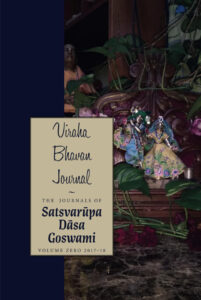
Viraha Bhavan Journal (2017–2018) was written by Satsvarūpa Mahārāja following a brief hiatus in writing activity, and was originally intended to be volume 1 in a series of published journals. However, following its completion and publication, Mahārāja again stopped writing books, subsequently focusing only on what became his current online journal, which began in August of 2018.
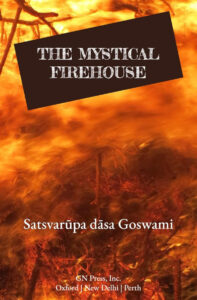
At first, I took it hard that I would have to live surrounded by the firemen, and without my own solitude. After all, for decades I had lived in my own house with my own books and my own friends. I was also now a crippled person who couldn’t walk, living among men who did active duties. But when Baladeva explained it to me, how it was not so bad living continually with other firemen and living in the firehouse with its limited facilities, I came to partially accept it and to accept the other men. I came to accept my new situation. I would live continually in the firehouse and mostly not go outside. I would not lead such a solitary life but associate with the other firemen.
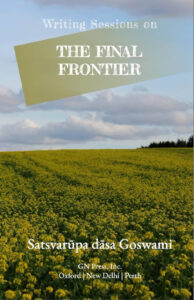
Let me write sweet prose.
Let me write not for my own benefit
but for the pleasure of Their Lordships.
Let me please Kṛṣṇa,
that’s my only wish.
May Kṛṣṇa be pleased with me,
that’s my only hope and desire.
May Kṛṣṇa give me His blessings:
Kṛṣṇa Kṛṣṇa Kṛṣṇa Kṛṣṇa Kṛṣṇa he
Rāma Rāghava Rāma Rāghava
Rāma Rāghava rakṣa mām.
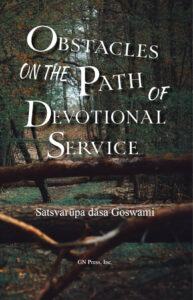
You mentioned that your pathway has become filled with stumbling blocks, but there are no stumbling blocks. I can kick out all those stumbling blocks immediately, provided you accept my guidance. With one stroke of my kick, I can kick out all stumbling blocks. —Letter by Śrīla Prabhupāda, December 9, 1972.
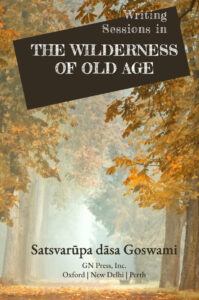
The Writing Sessions are my heart and soul. I’m trying my best to keep up with them. I am working with a few devotees, and they are far ahead of me. I wander in the wilderness of old age. I make my Writing Sessions as best I can. Every day I try to come up with a new subject. Today I am thinking of my parents. But I don’t think of them deeply. They are long gone from my life. Śrīla Prabhupāda wrote a poem when he was a sannyāsī, and he said now all my friends and relatives are gone. They are just a list of names now. I am like that too. I am a sannyāsī with a few friends. I love the books of Śrīla Prabhupāda. I try to keep up with them. I read as much as I can and then listen to his bhajanas.
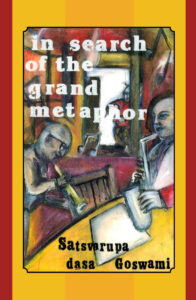
The metaphor is song. Explain it. Yes, particulars may not seem interesting or profound to readers who want structured books.
Wait a minute. Don’t pander to readers or concepts of Art. But Kṛṣṇa conscious criteria are important and must be followed. So, if your little splayed-out life-thoughts are all Kṛṣṇa conscious, then it’s no problem.
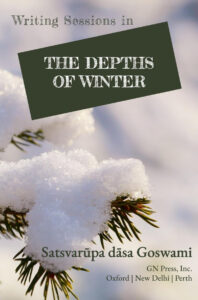
I am near the end of my days. But I do like the company of like-minded souls, especially those who are Kṛṣṇa conscious. Yes! I am prone to Kṛṣṇa consciousness. I have been a disciple of Bhaktivedanta Swami Prabhupāda for maybe almost sixty years. Sometimes I fail him. But I always bounce back and fall at his feet. It is a terrible thing that I sometimes do not have the highest love for him. It is a terrible thing. Actually, however, I never fall away from him. He always comes and catches me and brings me back to his loving arms.

This edition of Satsvarūpa dāsa Goswami’s 1996 timed book, Upstate: Room to Write, is published as part of a legacy project to restore Satsvarūpa Mahārāja’s writings to ‘in print’ status and make them globally available for current and future readers.
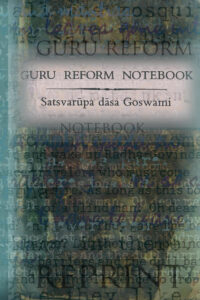
A factual record of the reform and change in ISKCON guru system of mid ’80s.
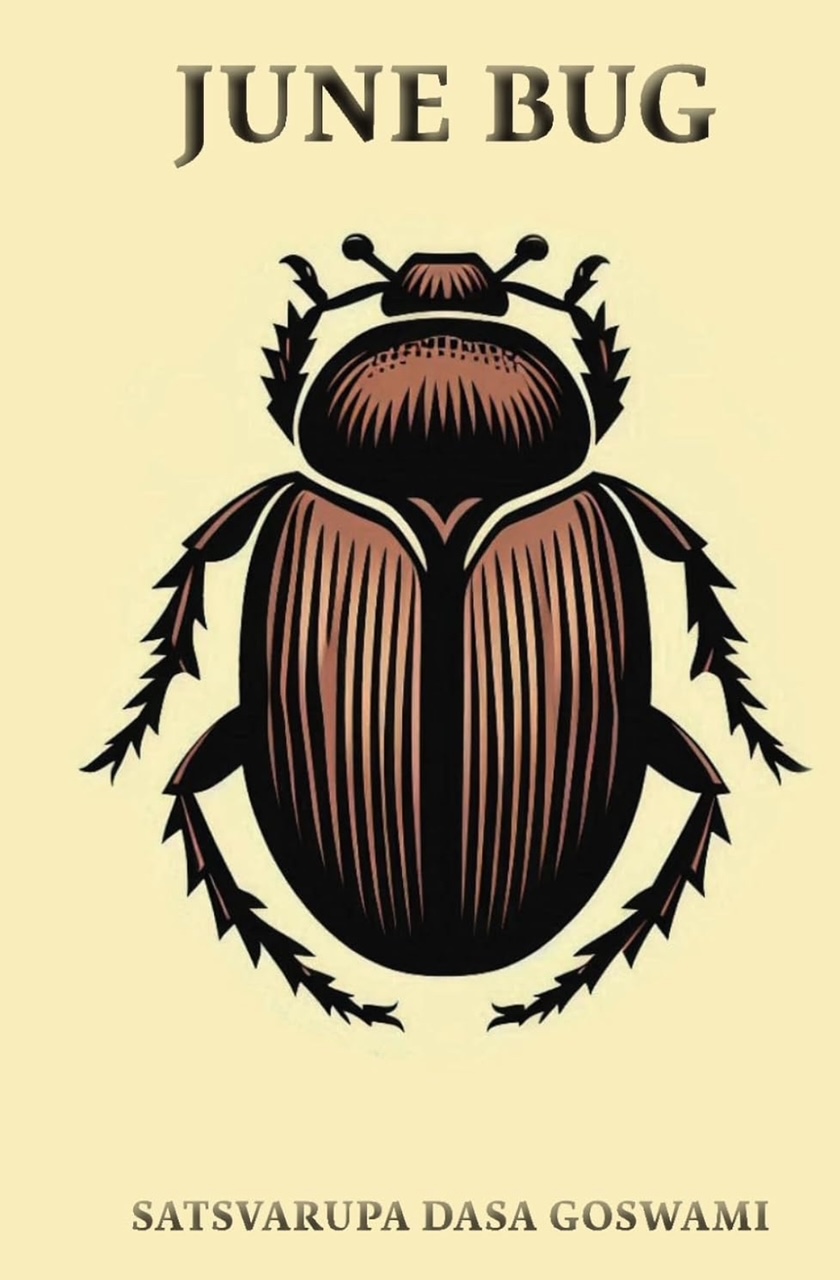
Readers will find, in the Appendix of this book, scans of a cover letter written by Satsvarūpa Mahārāja to the GN Press typist at the time, along with some of the original handwritten pages of June Bug. Together, these help to illustrate the process used by Mahārāja when writing his books during this period. These were timed books, in the sense that a distinct time period was allotted for the writing, during SDG’s travels as a visiting sannyāsī
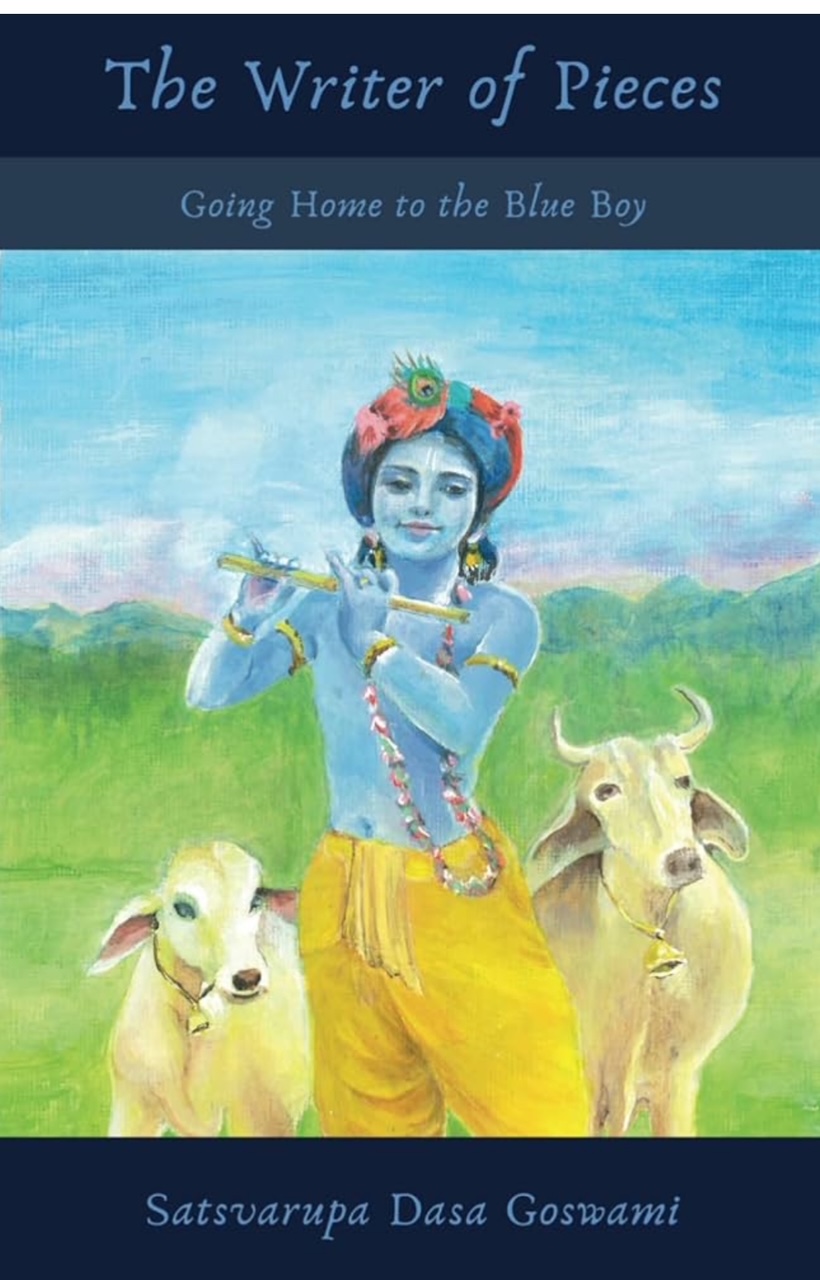
Don’t take my pieces away from me. I need them dearly. My pieces are my prayers to Kṛṣṇa. He wants me to have them, this is my way to love Him. Never take my pieces away.
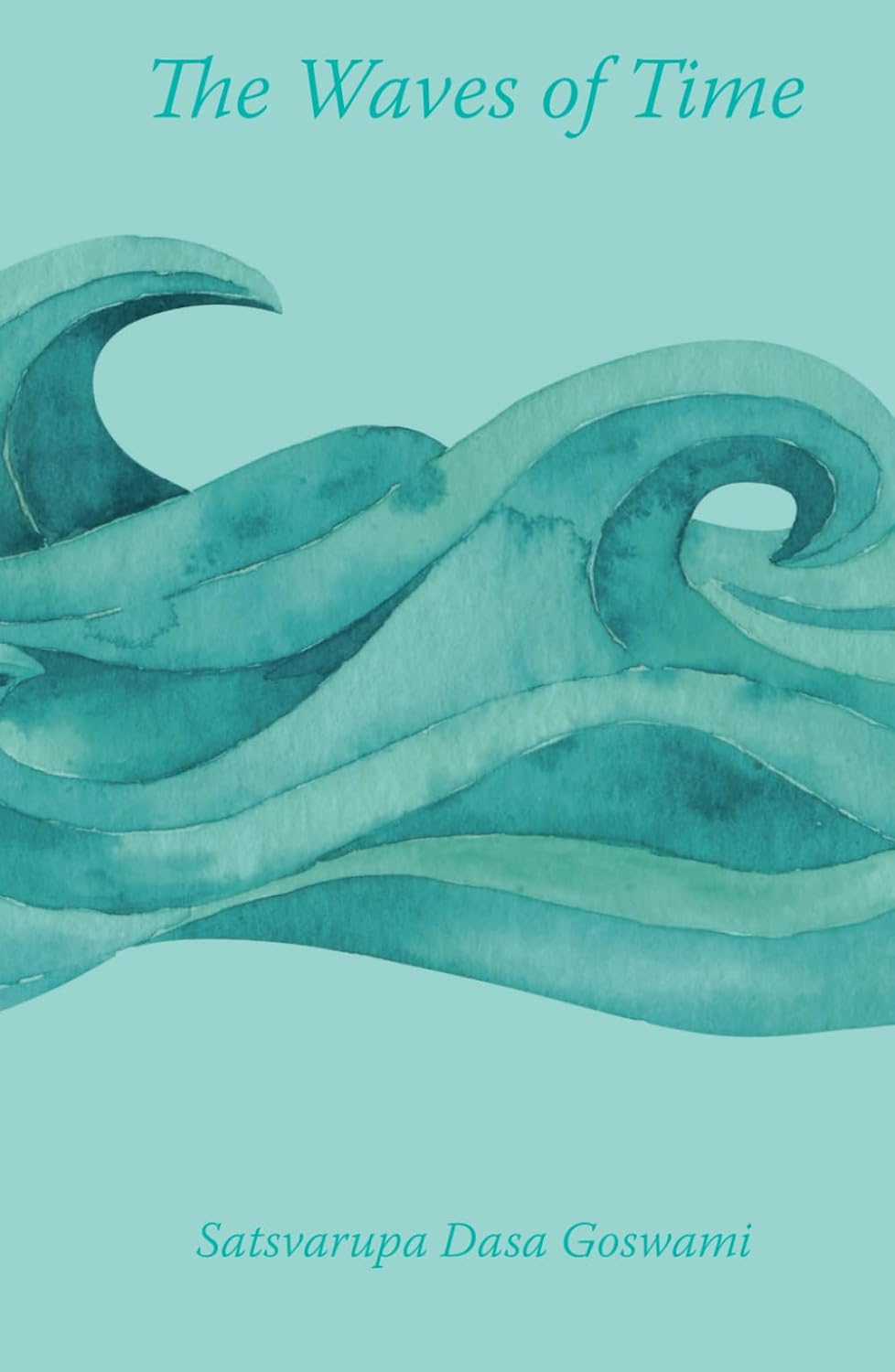
Many planks and sticks, unable to stay together, are carried away by the force of a river’s waves. Similarly, although we are intimately related with friends and family members, we are unable to stay together because of our varied past deeds and the waves of time.

To Śrīla Prabhupāda, who encouraged his devotees (including me) To write articles and books about Kṛṣṇa Consciousness.
I wrote him personally and asked if it was alright for his disciples to write books, Since he, our spiritual master, was already doing that. He wrote back and said that it was certainly alright For us to produce books.

I have a personal story to tell. It is a about a time (January–July 1974) I spent as a personal servant and secretary of my spiritual master, His Divine Grace A.C. Bhaktivedanta Swami Prabhupäda, founder-äcärya of the International Society for Krishna Consciousness. Although I have written extensively about Çréla Prabhupäda, I’ve hesitated to give this account, for fear it would expose me as a poor disciple. But now I’m going ahead, confident that the truth will purify both my readers and myself.

First published by The Gītā-nāgarī Press/GN Press in serialized form in the magazine Among Friends between 1996 and 2001, Best Use of a Bad Bargain is collected here for the first time in this new edition. This volume also contains essays written by Satsvarūpa dāsa Goswami for the occasional periodical, Hope This Meets You in Good Health, between 1994 and 2002, published by the ISKCON Health and Welfare Ministry.

This book has two purposes: to arouse our transcendental feelings of separation from a great personality, Śrīla Prabhupāda, and to encourage all sincere seekers of the Absolute Truth to go forward like an army under the banner of His Divine Grace A.C. Bhaktivedanta Swami Prabhupāda and the Kṛṣṇa consciousness movement.

A single volume collection of the Nimai novels.

Śrīla Prabhupāda was in the disciplic succession from the Brahmā-Mādhva-Gauḍīya sampradāya, the Vaiṣṇavas who advocate pure devotion to God and who understand Kṛṣṇa as the Supreme Personality of Godhead. He always described himself as simply a messenger who carried the paramparā teachings of his spiritual master and Lord Kṛṣṇa.

Dear Srila Prabhupada,
Please accept this or it’s worse than useless.
You have given me spiritual life
and so my time is yours.
You want me to be happy in Krishna consciousness
You want me to spread Krishna consciousness,

This collection of Satsvarūpa dāsa Goswami’s writings is comprised of essays that were originally published in Back to Godhead magazine between 1966 and 1978, and compiled in 1979 by Gita Nagari Press as the volume A Handbook for Kṛṣṇa Consciousness.

This second volume of Satsvarūpa dāsa Goswami’s Back to Godhead essays encompasses the last 11 years of his 20-year tenure as Editor-in-Chief of Back to Godhead magazine. The essays in this book consist mostly of SDG’s ‘Notes from the Editor’ column, which was typically featured towards the end of each issue starting in 1978 and running until Mahārāja retired from his duties as editor in 1989.

This collection of Satsvarupa dasa Goswami’s writings is comprised of essays that were originally published in Back to Godhead magazine between 1991 and 2002, picking up where Volume 2 leaves off. The volume is supplemented by essays about devotional service from issues of Satsvarupa dasa Goswami’s magazine, Among Friends, published in the 1990s.

“This is a different kind of book, written in my old age, observing Kṛṣṇa consciousness and assessing myself. I believe it fits under the category of ‘Literature in pursuance of the Vedic version.’ It is autobiography, from a Western-raised man, who has been transformed into a devotee of Kṛṣṇa by Śrīla Prabhupāda.”
 The Best I Could Do
The Best I Could DoI want to study this evolution of my art, my writing. I want to see what changed from the book In Search of the Grand Metaphor to the next book, The Last Days of the Year.
 a Hare Krishna Man
a Hare Krishna ManIt’s world enlightenment day
And devotees are giving out books
By milk of kindness, read one page
And your life can become perfect.
 Calling Out to Srila Prabhupada: Poems and Prayers
Calling Out to Srila Prabhupada: Poems and PrayersO Prabhupāda, whose purports are wonderfully clear, having been gathered from what was taught by the previous ācāryas and made all new; O Prabhupāda, who is always sober to expose the material illusion and blissful in knowledge of Kṛṣṇa, may we carefully read your Bhaktivedanta purports.

I use free-writing in my devotional service as part of my sādhana. It is a way for me to enter those realms of myself where only honesty matters; free-writing enables me to reach deeper levels of realization by my repeated attempt to “tell the truth quickly.” Free-writing takes me past polished prose. It takes me past literary effect. It takes me past the need to present something and allows me to just get down and say it. From the viewpoint of a writer, this dropping of all pretense is desirable.
 Geaglum Free Write
Geaglum Free WriteThis edition of Satsvarūpa dāsa Goswami’s 1996 timed book, Geaglum Free Write Diary, is published as part of a legacy project to restore Satsvarūpa Mahārāja’s writings to ‘in print’ status and make them globally available for current and future readers.